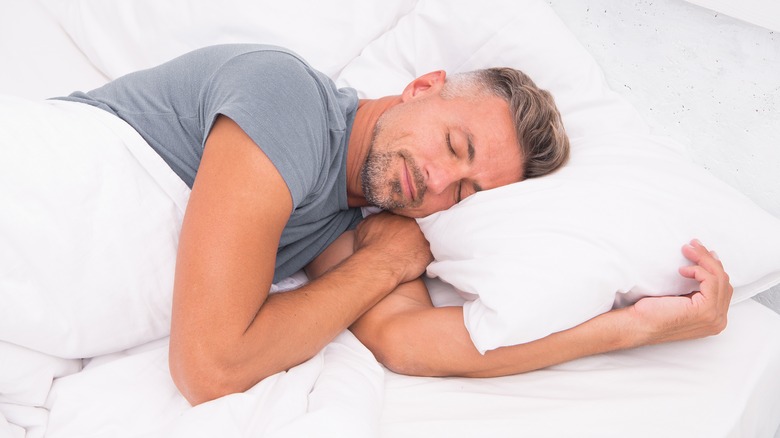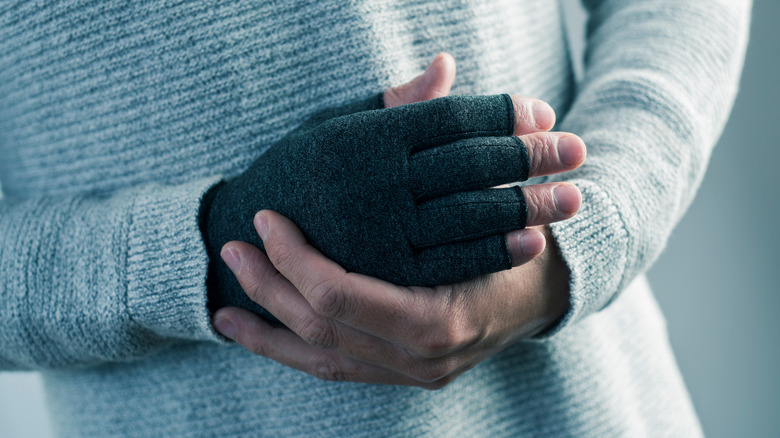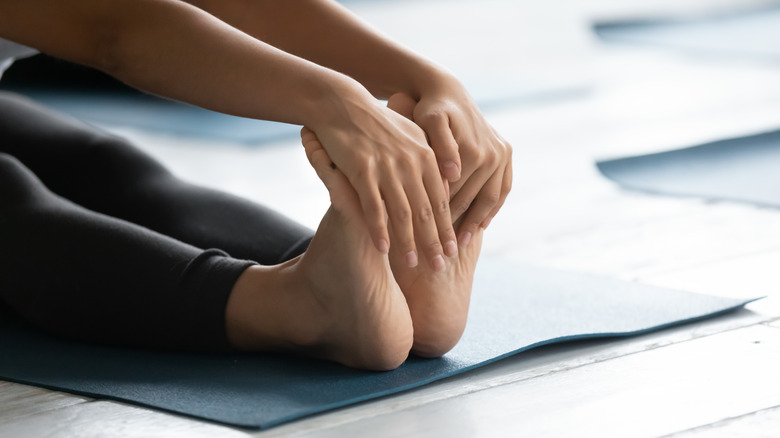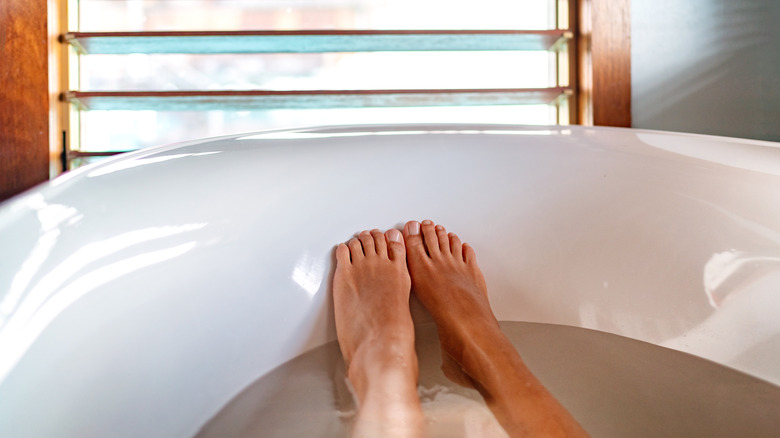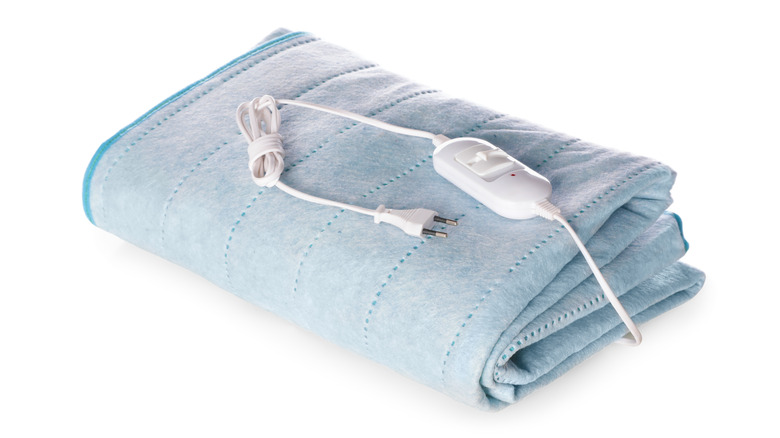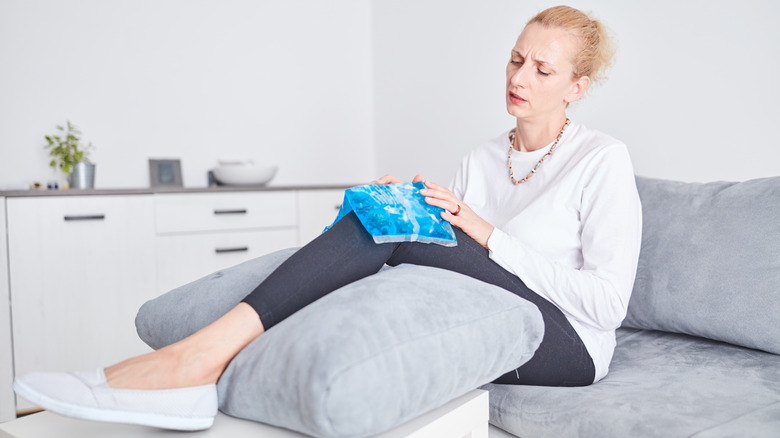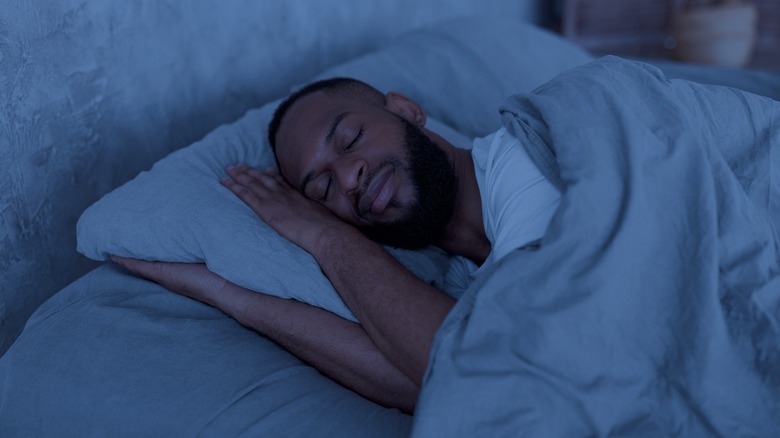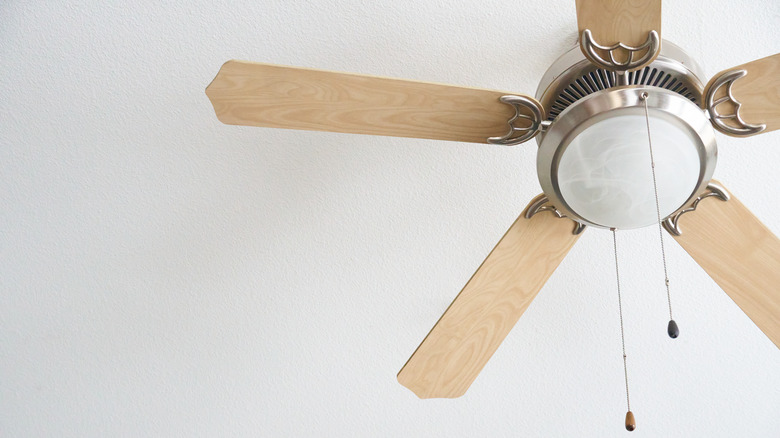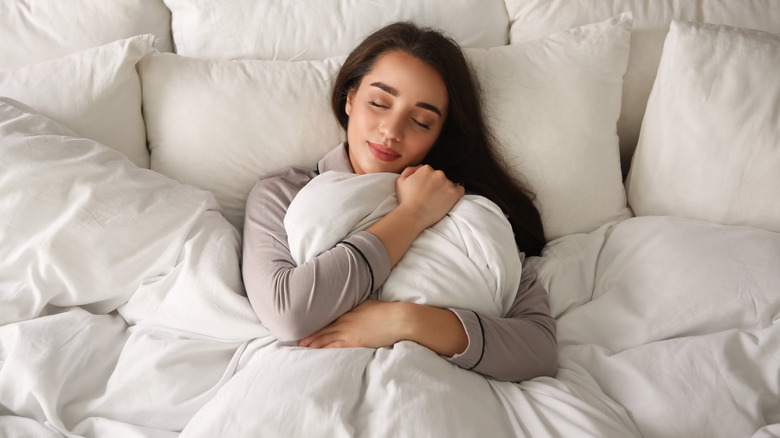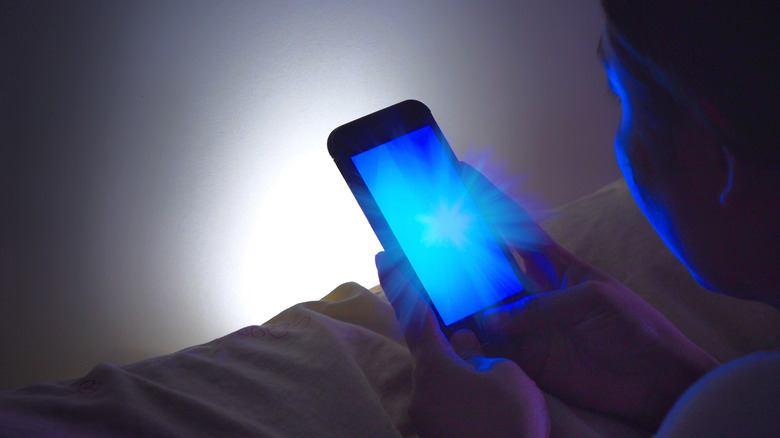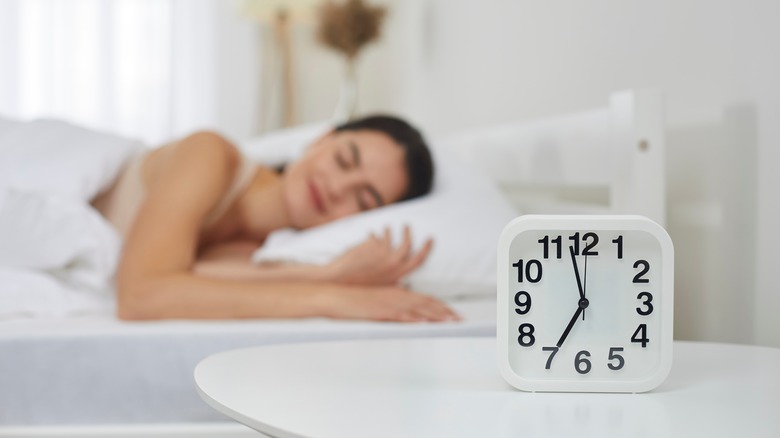Tips For Getting Better Sleep When Dealing With Arthritis Pain
Even if you're not that familiar with arthritis, it's not difficult to see why it might interfere with someone's sleep. After all, as the Mayo Clinic points out, common symptoms of multiple types of arthritis include pain, swelling, and/or stiffness in the joints — all of which could make falling and staying asleep challenging (per WebMD). But that doesn't mean there aren't possible options for getting a better night's sleep even with arthritis.
Before we go any further, let's first discuss what exactly arthritis is, since it can go well beyond just stiffness in one's hands. According to the Mayo Clinic, arthritis affects joints throughout the body, meaning that areas like the knees, the elbows, and even the neck and spine can all be arthritic. And while usually the older a person is, the worse their arthritis becomes, this health issue isn't exclusive to elderly individuals. Common types of arthritis include rheumatoid arthritis and osteoarthritis (both of which are very common), as well as gout and ankylosing spondylitis.
Of course, no matter what form of arthritis someone has, getting enough good quality sleep can be especially important not just for managing their condition, but also for their overall health (via WebMD). So, we'll be exploring some possible ways to get a better night's rest even with arthritis. However, if you have arthritis and are experiencing sleeping issues, you should first speak with a medical professional.
Skip the nightcap
As the Arthritis Foundation points out, some research supports a connection between consuming moderate amounts of alcohol regularly and a lower chance of developing rheumatoid arthritis (RA). So, an arthritis patient might think a nightcap before bed is a good idea when, in fact, it might be contributing to their sleep problems.
Despite the popular belief that drinking alcohol before bed might help one get a good night's sleep, alcohol could interfere with someone falling asleep, staying asleep, and sleeping deeply (via Medical News Today). Now to be fair, according to a research review published in Alcoholism: Clinical & Experimental Research, there are studies supporting that alcohol might help a healthy person drift off and even put them in a temporary deep sleep. However, it's believed that we get that truly restful restorative sleep during the stage of sleep known as rapid eye movement (REM) sleep. And these same studies found that alcohol can cut down on the time one spends in this sleep stage. Additionally, one of the review's authors, Dr. Irshaad Ebrahim, told WebMD that, "Alcohol also suppresses breathing and can precipitate sleep apnea."
Okay, but what about alcohol and arthritis-related sleep issues specifically? Well, as rheumatologist Dr. Karen Costenbader told the Arthritis Foundation, "Gout attacks can be brought on by purine-rich foods or drinks, and beer is high in purines." And these attacks can be disruptive to one's sleep. Finally, speak with a medical professional about alcohol consumption if you're taking any medications for arthritis.
Try therapy gloves
As WebMD explains, it's common for someone with rheumatoid arthritis (RA) to feel pain, swelling, and stiffness in the joints of their hands. In fact, it's often the first red flag of this health issue. And, of course, having pain in any part of one's body can be disruptive to sleep. But there are special gloves that when used as directed might help.
Before we go any further, it's important to note that you should always work with a medical professional when using any type of therapy glove. For one thing, there are different kinds, and so you should talk to your healthcare team to choose the best type to fit your needs. For example, thermals are therapy gloves that warm your hands. Compression gloves do just that: Compress your hands, which can help with finger and joint issues. Glove splints can act like a brace to support your hands. Any one of these might help reduce discomfort and promote a good night's sleep. Plus, some therapy gloves can be a combination of thermals, glove splints, and/or compression gloves.
No matter which type of glove you try, keep in mind that they're only supposed to be worn for eight hours. And, yes, these gloves don't work for everyone. But with that said, they're worth considering not only because they might help an RA patient get a good night's sleep, but also because they can have other benefits like improving one's grip.
Don't avoid exercising
Let's be honest. If someone has arthritis, then exercising might sound like the last thing they want to do. But as the American College of Rheumatology explains, exercise can be beneficial for someone with arthritis in multiple ways, including helping them get a better night's sleep. However, there are a couple of things to remember when setting up a workout schedule with your healthcare professional.
To start, exercises can be divided into four basic categories: body awareness, flexibility, strengthening, and aerobic. Now to be clear, all of these exercises can be beneficial for someone with arthritis. But aerobic exercises could help an arthritis patient who is having difficulty with getting a good night's rest. So too can flexibility exercises (specifically stretching exercises), as well as body awareness exercises that promote relaxation. But as the old saying goes, timing is everything, so when you choose to do any of these exercises can make a difference when it comes to sleep.
For example, if you go to bed at 10:00 p.m., then doing aerobic exercises between 8:00 p.m. and 10:00 p.m. might not help you sleep, according to the American College of Rheumatology. On the other hand, stretching and/or exercises that promote relaxation before bed can both help with sleeping problems. Just remember, when it comes to exercise in general, start slow, especially if you haven't exercised in a while.
Try warm water
If you research arthritis, chances are you'll see both heat and cold therapies listed as possible treatments for pain relief (via WebMD). While this might seem contradictory, both can be helpful for arthritis patients, although some might respond better to heat than cold and vice versa. Also, a combination of heat and cold therapies is sometimes the key to easing arthritis-related discomfort. For the moment, however, let's focus on a type of heat therapy and how it might help with sleep.
Remember, when you apply heat to an area of the body, it causes the blood vessels in that area to expand, which can help with circulation. Plus, heat can help with pain and muscle spasms. So, if you have arthritis, a soothing warm bath before bed might help you get a good night's rest. The Orthopaedic Specialty Group, P.C. explains that a bath can help with stiff joints, as well as help one relax. Also, according to Winchester Hospital, balneotherapy (treating diseases with baths) might help with conditions like osteoarthritis, rheumatoid arthritis, and ankylosing spondylitis.
If you prefer showers over baths, then good news: A warm shower can also help with joint stiffness and so might promote a good night's sleep, per Medical News Today. And if you have a hot tub, that can help with pain from arthritis since it involves both heat therapy and hydrotherapy. However, hot tubs aren't recommended for people with certain health problems, including acute inflammation, dementia, and open wounds.
Heating pads can help
If you have osteoarthritis, then this next suggestion might really help with your sleep quality. According to the Cleveland Clinic, heat therapy can be especially beneficial for someone with osteoarthritis-related pain. So, you might want to try a heating pad for a better night's rest. However, there are some important dos and don'ts.
As the Cleveland Clinic explains, you should keep a heating pad on low or medium heat, and even if it's soothing, don't sleep with an electric heating pad, per Alberta Health Services. Instead, Granite Bay Advanced Joint Pain Relief Solutions recommends only using a heating pad for 15 to 20 minutes and then letting the area cool off before turning in for the night. With that said, some arthritis patients find a heated mattress cover can help promote a good night's sleep (via Health Central). So too can an electric blanket, via WebMD. But you should speak with a medical professional before using any of these products.
If you don't own a heating pad, you can improvise one by heating a wet washcloth in the microwave (per Cleveland Clinic). However, be careful not to heat it for too long (20 seconds should be enough time) and test its temperature before applying to avoid putting something too hot against an area of your body that's already in discomfort. Finally, wrap the washcloth in a dry towel before using it.
What about cold therapies?
Even though widening blood vessels with heat might help with arthritis, so too can constricting them with cold since that can bring down swelling (via WebMD). And using cold packs might help numb deep pain. So, yes, cold therapies can help with arthritis-related issues and promote good sleep, but there are some things to keep in mind.
According to Health Central, joint pain interfering with sleep is a common problem for rheumatoid arthritis (RA) patients. But using ice alone or with heat during the day might help reduce pain at night. Also, one psoriatic arthritis patient told CreakyJoints that "Heat makes the rashes from my psoriatic arthritis feel worse, so I have ice packs I keep in the freezer and put them down my pajamas at bedtime."
If you want to try an ice pack, Healthline recommends wrapping it in a towel rather than applying it directly to your skin. If you don't have an ice pack, you can substitute a bag of ice or frozen food, as well as a frozen wet towel or sponge, as long as you wrap whatever you use in a towel. Use it for 20 minutes, but remove it sooner if you feel numbness in your skin. Also, you can try massaging an arthritic area with an ice cube. However, speak with a medical professional before trying any cold therapies.
The right pillow or pillows can help
Pillows can make a difference when it comes to sleep. But according to the Arthritis Foundation, when choosing pillows, you need to keep in mind which part of your body is affected by arthritis, as well as your favored sleeping position.
For example, if you have neck issues and sleep on your back, you might want to try a thin pillow. On the other hand, if you sleep on your side, then a taller pillow positioned under your neck might give you better support. If you have arthritis in your back, then a thin pillow under your head along with a second and a third pillow under your knees and the small of your back respectively might help. But if you sleep on your side, then you might try placing a pillow between your knees and another under the curve at your waist. Back sleepers with shoulder problems might try sleeping either with a pillow under each arm or with a wedge under their trunk and a pillow under their knees.
If you have arthritis-related problems with your hips, you might try two pillows — one beneath your knees and one beneath the small of your back — if you sleep on your back. And you might want to try keeping a pillow between your knees if you have knee issues and sleep on your side. A medical professional might have further suggestions about pillow placements.
Try cooling down the room
While certain therapies can help with arthritis especially at night, they also can add to one's discomfort in other ways. For instance, one rheumatoid arthritis (RA) patient told CreakyJoints that, "My rheumatoid arthritis kills my sleep; I can never find a comfortable position without using tons of pillows and [heating] pads, but then those things make me too hot." This is where controlling the temperature of one's room can make a big difference. Some options CreakyJoints points out are to open the bedroom window, turn up the air conditioning, or invest in a high-powered ceiling fan.
Even though cooling down one's room might help with sleep, there are some recommendations for how low the temperature should go. While the National Sleep Foundation advises sleeping at 60 to 67 degrees Fahrenheit, physical therapist Dr. Varsha Seemangal told CreakyJoints she recommends sleeping in a room that's a bit warmer since, "colder temperatures can cause the joints to stiffen and tighten up even more, leading to a more uncomfortable sleep."
Consider buying a new mattress
Okay, let's be frank. Buying a mattress can be a major purchase. But it could be a valuable investment in your health, especially if you have arthritis and are having trouble sleeping. And while we can't guarantee that a new bed will solve your sleep problems, there are some indicators that you might be due for a mattress upgrade.
The Sleep Foundation notes that a mattress that's six to eight years old might be too old. Also, is your mattress sagging anywhere or in any way damaged? That too can contribute to arthritis pain and joint stiffness. Even if neither of these things is the case, ask yourself if you slept better on your last trip when you stayed at a hotel. If so, then it might be time to consider a new mattress. And while the ideal mattress for every person can vary, physical therapist Dr. Varsha Seemangal told CreakyJoints that "A firm mattress is advised because it supports the joints of the body better than a soft mattress, which will allow the body to sink into it, thus creating an unsupportive environment for the joints while the body is relaxed."
Besides the mattress, the height of one's bed can also make a difference when it comes to arthritis. Dr. Seemangal noted that having a bed that's too low can be rough on one's joints not just when climbing into bed, but also when getting up in the morning.
Choose the right bedding and sleepwear
Picking the right fabrics for bedding and sleepwear can have a beneficial impact on someone with arthritis-related sleep issues. For instance, while a person without arthritis might see blankets and sheets as comfortable and even soothing, an arthritis patient might view these types of bedding as added weight to common arthritic areas like the knees, the ankles, and the feet (via CreakyJoints). This is why physical therapist Dr. Varsha Seemangal told CreakyJoints that "Sheets and blankets, as well as sleepwear, are all recommended to be a breathable fabric to allow for air flow from the body throughout the night." And Dr. Meryl Picard, assistant professor in the Department of Occupational Therapy at Seton Hall University, advised the Arthritis Foundation that smooth fabrics like microfiber, cotton, or silk are best because an arthritis patient can move easily in them, which reduces the chances of stiffness in the morning.
Additionally, CreakyJoints states that a lightweight blanket can be a good choice for someone with arthritis. But if you're still having difficulty with the weight of your bedding, Dr. Picard tells the Arthritis Foundation that blanket lifters might help.
Diet might help gout patients sleep better
Some forms of arthritis like osteoarthritis literally have the word "arthritis" in their name. But don't make the mistake of thinking that's always the case. Gout, for example, is also a type of arthritis and is known for sudden attacks that can be disruptive to one's sleep (via Mayo Clinic). Managing one's gout through diet might help patients with this form of arthritis get a better night's rest.
When your body has large amounts of uric acid, that can set the stage for gout. And, as Health Central points out, some foods might increase the amount of uric acid in one's body, which raises the likelihood of having a gout flare. These include foods and beverages high in sugar, as well as seafood and red meat. However, a gout management diet isn't only about eliminating foods, but also adding the right ones into your meals and snacks. For instance, cherries might help lower the amount of uric acid in one's body. Yogurt and cheese might also be beneficial. And you might want to consider adding more beans to your meal plan. Plus, it's important to stay properly hydrated; however, drinking water and other types of beverages too close to bedtime can also disrupt one's sleep. But before you make any changes to your diet, speak with a health care professional.
No screens before bed
This next tip is actually good for just about anyone having trouble getting a good night's sleep. However, the Mayo Clinic specifically says it can be helpful for someone with psoriatic arthritis not to use screen devices for at least half an hour before bedtime.
Before we go any further, let's discuss what exactly is psoriatic arthritis. And, yes, there is a connection between it and the skin disease psoriasis (via Mayo Clinic). Basically, if you have psoriasis (which typically causes red, scaly skin), then there's a chance you might develop psoriatic arthritis. Like other forms of arthritis, psoriatic arthritis can cause swelling, pain, and stiffness in one's joints. And patients with psoriatic arthritis can have difficulty drifting off to sleep, staying asleep, and getting a good-quality night's rest. Compounding this situation are devices with screens like tablets and smartphones, because the light from them can throw off our bodies, making it harder to sleep. Also, let's not forget that poor sleep can worsen psoriatic arthritis pain, which has the potential to create an unhealthy cycle. So, if you're having trouble sleeping, you might want to put away screen devices well before going to bed. Instead try reading a book or a magazine (just not electronically) at bedtime (via HuffPost). Or you might want to listen to some relaxing music.
Keep a sleep diary
Sometimes it can seem obvious why arthritis would keep someone up at night. Namely, it can cause pain and discomfort. But sometimes an arthritis patient could be overlooking other factors that might improve their sleep quality. Therefore, keeping a sleep diary might help.
According to the Sleep Foundation, there's a great deal more to journaling about one's sleep than just noting what days you slept well or poorly. When you went to sleep, the amount of time it took for you to fall asleep, and whether or not you slept throughout the night can all be useful pieces of information for a sleep diary. Also, the Arthritis Foundation notes that the time you woke up the next day and if you napped during the day are also important. You should also note any medications you're taking. And don't forget, exercise can impact sleep, so you should write down when you worked out and for how long, as well as what types of exercises you did. Additionally, jotting down when and how much alcohol or caffeine you consumed during a 24-hour period can be valuable information. Furthermore, you should include any stressful happenings or events in your sleep diary.
If you're working with a medical professional, they might have a sleep diary form that could include the above details, as well as other ones (via The Sleep Foundation). Just make sure to fill out the form daily to avoid forgetting anything.
Stick to a fixed sleep schedule
If you heard the phrase "it's past your bedtime," you'd probably think it's being said to a child. In fact, Healthline notes that there's data supporting that going to bed at the same time every night is beneficial for children. But maintaining a sleep routine can also be helpful for adults, including patients with arthritis.
As a study in Scientific Reports notes, getting your sleep on a schedule might help lower the odds of developing chronic health problems. In other words, it's better to go to bed at (for example) 10:00 pm every night and wake up at the same time every morning than to keep going to bed at different times and adjusting your alarm clock to make up the difference. And the Arthritis Foundation recommends that patients maintain a consistent sleep schedule all seven days a week, as well as on vacations.
Besides going to bed and getting up at the same time every day, the Arthritis Foundation also advises not napping in order to get a better night's rest. Now, so there are no misunderstandings, napping in and of itself isn't a bad thing. But if you're having trouble sleeping at night, napping could be throwing off your sleep cycle and contributing to your difficulty getting the amount of restorative sleep that you need.

